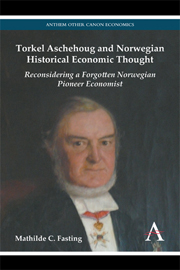 Torkel Aschehoug and Norwegian Historical Economic Thought
Torkel Aschehoug and Norwegian Historical Economic Thought Book contents
- Frontmatter
- Contents
- Acknowledgements
- Chapter 1 Introduction
- Chapter 2 Biography
- Chapter 3 Norwegian Economic and Political Context in the Nineteenth Century
- Chapter 4 Norwegian Economic Thought and Method
- Chapter 5 Development of the Economic Thought of Aschehoug: Statsøkonomisk Forening and the Socialøkonomik Project
- Chapter 6 The German Historical School: Similarities, Influences and Discrepancies
- Chapter 7 Alfred Marshall: Aschehoug and the Adoption of Marginal Theory
- Chapter 8 The French Influence: Adopting Say and Refuting Socialism
- Chapter 9 Views of Labour in the Work of Aschehoug
- Chapter 10 The Entrepreneur: The Fourth Production Factor
- Chapter 11 Trade and Customs Debates from 1840 to 1906
- Chapter 12 The Theory of Economic Crises
- Chapter 13 The Legacy of Aschehoug: Concluding Remarks
- Appendix A Other Norwegian Turn-of-the-Century Economists
- Appendix B Drafts for Socialøkonomik
- Appendix C Detailed Contents of Socialøkonomik (First Editions from 1903 to 1908)
- Notes
- Literature
- Index
Chapter 8 - The French Influence: Adopting Say and Refuting Socialism
Published online by Cambridge University Press: 05 March 2014
- Frontmatter
- Contents
- Acknowledgements
- Chapter 1 Introduction
- Chapter 2 Biography
- Chapter 3 Norwegian Economic and Political Context in the Nineteenth Century
- Chapter 4 Norwegian Economic Thought and Method
- Chapter 5 Development of the Economic Thought of Aschehoug: Statsøkonomisk Forening and the Socialøkonomik Project
- Chapter 6 The German Historical School: Similarities, Influences and Discrepancies
- Chapter 7 Alfred Marshall: Aschehoug and the Adoption of Marginal Theory
- Chapter 8 The French Influence: Adopting Say and Refuting Socialism
- Chapter 9 Views of Labour in the Work of Aschehoug
- Chapter 10 The Entrepreneur: The Fourth Production Factor
- Chapter 11 Trade and Customs Debates from 1840 to 1906
- Chapter 12 The Theory of Economic Crises
- Chapter 13 The Legacy of Aschehoug: Concluding Remarks
- Appendix A Other Norwegian Turn-of-the-Century Economists
- Appendix B Drafts for Socialøkonomik
- Appendix C Detailed Contents of Socialøkonomik (First Editions from 1903 to 1908)
- Notes
- Literature
- Index
Summary
The third and final international influence on Aschehoug to be analysed in this book, that of the French, will be the topic for this chapter. Even though the French influence on his economic thought was not central, it was nevertheless substantial. More than one hundred and thirty different French authors can be found in his author index. A brief re-examination of Aschehoug's own research position, which it is important to understand while reading Socialøkonomik, will be followed by a more thorough analysis of Aschehoug's work in order to outline how he used, and was inluenced by, French economic, social and political thought. This chapter will show that he mostly found it useful for historical, philosophical and ideological purposes, and as a means to explain his own ideas. It is more often commented on in historical outlines rather than in concrete discussions of economic issues and definitions.
His first sources were from as far back as the eighteenth century, and his comments on the physiocrats and on Turgot will begin this analysis, continuing with the nineteenth century, and two different French traditions or schools of thought. The first is the well-known French liberal school, sometimes referred to as the ‘Paris group’. This school is represented by economic thinkers such as Jean-Baptiste Say, Michel Chevalier, the two brothers Paul and Anatole Leroy-Beaulieu, Charles Dunoyer (1786–1862), Frédéric Bastiat, A. E. Cherbuliez, Maurice Block and Pierre Emile Levasseur (1828–1911).
- Type
- Chapter
- Information
- Torkel Aschehoug and Norwegian Historical Economic ThoughtReconsidering a Forgotten Norwegian Pioneer Economist, pp. 121 - 140Publisher: Anthem PressPrint publication year: 2013


